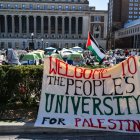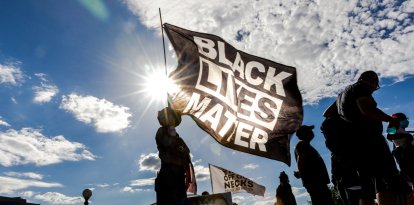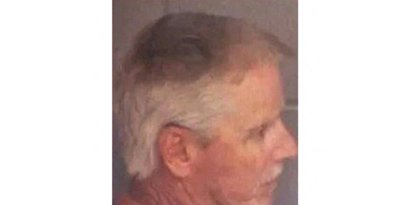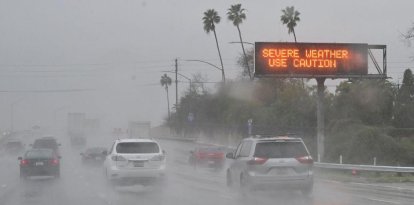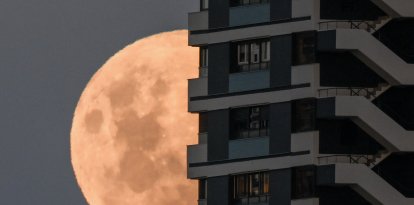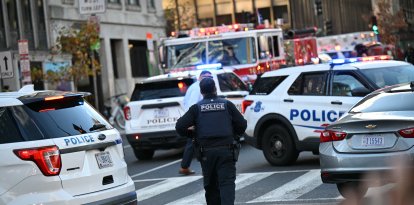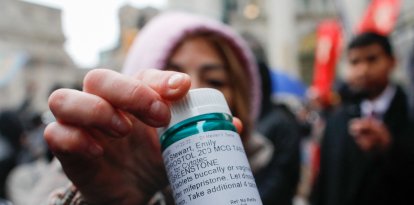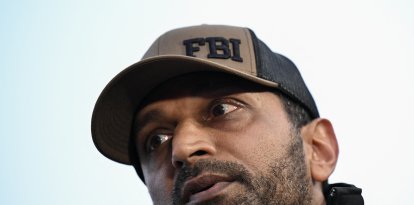Internal Columbia University report highlights ‘crushing" climate of antisemitic discrimination, calls for ‘urgent’ change
Columbia University's Task Force on Antisemitism interviewed hundreds of Israeli and Jewish students about their experience on campus after Oct. 7.

Demonstrations at Columbia University.
"People that you sat in class with, you had drinks with, you had lunch and dinner with, the next day they say they hope your entire family dies," recounts one of more than 500 students who shared their testimony with the Columbia University Task Force on Antisemitism about their experience after Oct. 7. "I have had people spit at me, I have had people yell at me."
In a new report, the second edition, task force members compile "crushing" cases of harassment, ostracism, verbal and physical violence against Jewish and Israeli students. Some even "suggest violations of federal and state law."
The report describes a climate of fear, with students even avoiding walking alone on campus. "Many students described walking down hallways as a painful daily routine," it explains. There were instances, it says, of students reporting "having necklaces ripped off their necks and being pinned against walls, while walking back to their dorms on Friday afternoon and when they were on their way to synagogue."
"In October, people began banging on her door at all hours of the night, demanding she explain Israel’s actions. She was forced to move out of the dorm."
Incidents were not limited to common areas, but were also reported within student groups, even if these had little to do with Israel, Palestine or the region. Social media platforms saw messages such as "if you support Israel, you are a piece of filth not even worthy of being called human … I wish you enormous pain and suffering." There were even incidents in the classroom.
"Some students reported that in the human rights sessions of the Core curriculum, during the first week of the year’s Masters of Public Health program, a faculty member presented concerning content. In the first session, the professor extensively discussed, by name, Jewish donors to Columbia University, one for whom the school is named and another for whom one of the school’s buildings is named; the faculty member called these Jewish men 'wealthy white capitalists' who 'laundered' 'dirty money' and 'blood money' at Columbia."
It matters who you are
The report insists on specifying that the discrimination is against Jews and Israelis because of who they are and not because of what they think or did. One student who participated in pro-Palestinian protests was called a "Judenrat," a "disgrace" and a "self-hating Jew."
Another recounted that he is part of the "queer community as well," which had been "super welcoming" until they realized he was Jewish. "That is uniquely painful," he explained, "because it feels like a group that is designed to be accepting of everyone is rejecting me."
Institutional inaction
More training, a clear definition of "antisemitism," rules for student groups... The task force proposes a "wide range of responses" to deal with the antisemitic boom on campus, some individual and many institutional.
The staff response was, in many cases, insufficient, with some members "unwilling to acknowledge the antisemitism many students have experienced" while "others minimized the concerns of these students, reacting sluggishly and ineffectively even to the most clear-cut violations."
"More than once, students asked if someone had to be stabbed or shot for the University to do something."
The report records the testimony of members of the university suggested to students that they go to a therapist, as if the problem was inside the victim's head. It was as if "they just need to learn to accept and cope with antisemitic experiences."
There were also cases of students who were unsure to whom or how to report the attacks. At this point, the researchers detail that it would be appropriate to go to deans' offices, ombudsmen or DEI (diversity, equity and inclusion) offices. The response from these, they point out, was often insufficient.
"Purported University 'org charts' singling out Jewish trustees, cartoons comparing Israelis to skunks... echo traditional canards."
On the various DEI offices at Columbia, the report adds that, in general, Jewish hatred is not one of their concerns. "This omission fed into a perception of bias in which Jews figured as oppressors in an oppressor/oppressed binary whose power meant they could not be discriminated against," the task force explains. While, "for others, the omission merely indicated a notable absence of concern for Jewish students."
Need for change
"There is an urgent need to reshape everyday social norms across the campuses of Columbia University... But we are a long way from there," the report acknowledges. "The problems we have found are serious and pervasive."
The task force announced that its next report will focus on classes and curriculum. While the internal inquiry continues, Columbia also faces investigations from Congress and the administration.





